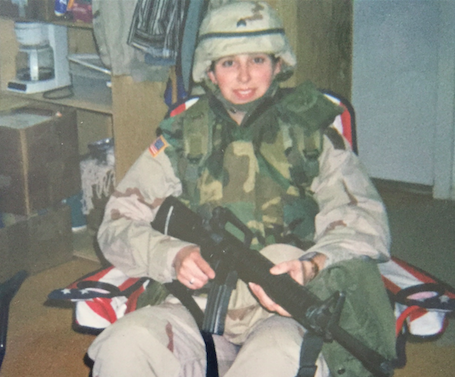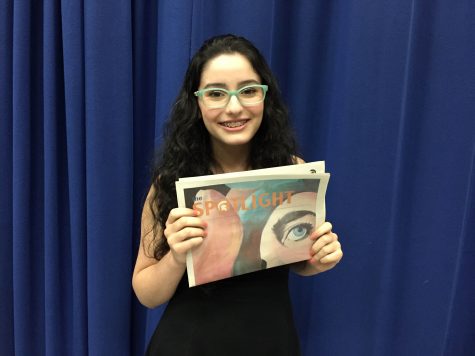Ms. Viola’s Ventures from Military to Math Teacher

“We went inside Saddam Hussein’s palace, which we turned into a US embassy in Baghdad, and watched a movie in his private movie theatre,” Ms. Viola said.
To students, she is Ms. Viola, a calculus and applied algebra teacher. To the men and women she served with, she was First Lieutenant Viola. Now, Ms. Justina Viola stands proud as a veteran with 20 years and two months of military experience under her belt. Throughout this time, she spent six years on active duty.
“It’s really cool that she served,” senior Brad Polek said. “I have a lot of respect for her.”
Ms. Viola enlisted in the Army National Guard as an 18 year-old college freshman on October 24, 1995.
“It was one of those things where I was always very patriotic. I got to college and started thinking about my future,” Ms. Viola said. “I got something in the mail and thought, ‘This is something I can do to serve my country and show my patriotism. I didn’t want to go into the Marine Corps because I didn’t want to cut my hair off. The next coolest branch was [the] Army.”
Once enlisted, Ms. Viola attended boot camp. During this time, she learned a variety of skills including how to throw grenades, fire a rifle accurately, “blow things up,” use a bayonet, and fight in close quarters.
“Boot camp is a psychological challenge. You learn teamwork. Everything’s about teamwork,” Ms. Viola said. “If one person makes a mistake, everyone’s in trouble. They try to make you think as a team, because when you go into combat, you have to work together. You help each other build.”
Along with building skills and values, boot camp provides simulations to prepare the soldiers for possible events during combat. These simulations range from having the soldiers performing tiresome tasks such as running with heavy equipment to even enduring a gas chamber.
“You get the ‘fun’ gas chamber, which is of course sarcastic.” Ms. Viola said. “They put you in this giant room and take capsules of irritant gas. They make you take your gas mask off and talk to them. If you try to run out, they make you go to the end of the line. They want you to breathe it in so they know you won’t freak. You need to know how to react.”
Typically, soldiers planned to be deployed receive a two-month notice. However, in 2003, the then 26-year-old Ms. Viola got a two week notice from the Army that she would be fighting in Afghanistan.
“I packed all of my army gear. Uniforms, equipment, personal hygiene items, but nothing civilian. You only get two big, green duffle bags,” Ms. Viola said. “When I arrived in Afghanistan, I was overwhelmed and tired. The time difference is way more than I’ve experienced. It was hot. We got there at the end of June, and it was 120º fahrenheit.”
From 2003-2004, Ms. Viola was stationed in Afghanistan. While her official job was to be a military religious leader who planned ceremonies, funerals, and provided grief counseling, she was also an on-duty, active soldier who participated in combat daily.
“The first time I got shot at, I peed my pants,” Ms. Viola said. “After a while, you get used to it. Everything is considered a combat zone. When you see on TV that ‘here is combat and here’s the behind the scenes, and everyone gets attacked at the same time,’ it’s a misconception. It’s all combat in one way, shape, or form.”
While Ms. Viola returned home from Afghanistan in 2004, her military career was not over. Two years later, she was deployed overseas again, and was stationed in Iraq from 2006-2007. This time her training was in military intelligence.
“[Military intelligence consists of] knowing what the enemy is planning to do so that the NATO forces can stop them or avoid them. I had to figure out where IEDs were placed so we wouldn’t run over them or get blown up by them, know where a terrorist leader was to try and capture them, and know where they kept their supplies so we could go raid it,” Ms. Viola said. “It requires a top secret military clearance and statistical analysis. Looking for patterns and then communicating that information to all of our soldiers (both people in charge of me and who I’m in charge of) was very important.”
During her time fighting, Ms. Viola says she carried a mustard seed and an angel with the American flag on it in a small pouch for good luck. She had to carry her gun everywhere she went.
“We all named our rifles,” she said. “Everyone did it for good luck. Mine was ‘Bertha.’”
Ms. Viola’s communication back home varied depending on where she was stationed.
“Afghanistan didn’t have the infrastructure to support the internet and phone calls,” she said. “We could make one 15-minute phone call to our families each week.”
In Iraq, the infrastructure was stronger, allowing for more frequent communication.
“We had internet, and I was able to email my family a couple times a week and call home twice a week for 30-45 minutes,” Ms. Viola said.
She could also send and receive mail, which is called “snail mail” throughout the military.
“My favorite package was when my mom sent me Crème de Menthe flavoring, green food coloring, and a milkshake cup so I could make my own shamrock shake for Saint Patrick’s day,” Ms. Viola said. “She sent shamrock sunglasses and cards. That was the coolest.”
When not in active combat, Ms. Viola said she and the other soldiers would play a card game with changing rules called “Fluxx,” read every book they could get their hands on, and watch every movie they could find.
In fact, Ms. Viola’s most memorable overseas experience involved one of the movies she saw. Though she cannot remember the exact title, she can remember the theatre she saw it in: a private movie theater inside Saddam Hussein’s palace which was turned into a U.S. embassy in Baghdad.
“I remember going down the marble staircases into a movie theatre as big as our band room,” Ms. Viola said. “I was like, ‘Who has this?’ The foyers and bedrooms and everything [were] made out of marble, and then to go out and see how the Iraqi people lived in mud huts…I was shocked.”
On December 8, 2015, Ms. Viola retired as a disabled veteran due to injuries she received to her hip and back while fighting in the Middle East.
“It’s incredible to think that Ms. Viola also fought overseas,” junior Amber Beltz said. “You’d never expect your calculus teacher to also be trained by the army. I really respect that she is.”
Ms. Viola says that her military experience made her understand sacrifice and appreciate the little things in life. She advises students who are questioning whether or not to enlist to make sure they research the branches they’re considering and also understand the job.
“You have to pick a job speciality inside the military. There’s so many choices. Understand you’re going to be away from you family a lot, but also you’ll get to go to cool places and travel the world,” Ms. Viola said. “You meet a lot of diverse people and experience things you would never get to otherwise. You build camaraderie and close relationships with people who truly understand who you are and how you think. Those friendships last a lifetime.”

Senior Emily Oberlender is a third-year staff member and the current opinion editor for the Spotlight. She previously served for one year as the news editor....

